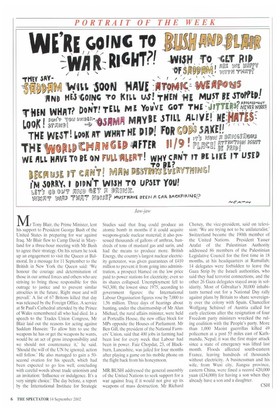Jaw-jaw M r Tony Blair. the Prime Minister, lent his support
to President George Bush of the United States in preparing for war against Iraq. Mr Blair flew to Camp David in Maryland for a three-hour meeting with Mr Bush to agree their strategy. On his return he took up an engagement to visit the Queen at Balmoral. In a message for 11 September to the British in New York the Queen said: 'We honour the courage and determination of those in our armed forces and others who are striving to bring those responsible for this outrage to justice and to prevent similar atrocities in the future. Right must and will prevail.' A list of 67 Britons killed that day was released by the Foreign Office. A service at St Paul's Cathedral attended by the Prince of Wales remembered all who had died. In a speech to the Trades Union Congress, Mr Blair laid out the reasons for acting against Saddam Hussein: 'To allow him to use the weapons he has or get the weapons he wants, would be an act of gross irresponsibility and we should not countenance it,' he said. 'Should the will of the UN be ignored, action will follow.' He also managed to gain a 50second ovation for his speech, which had been expected to go less well, concluding with careful words about trade unionism and an invitation: 'Influence or indulgence. It's a very simple choice.' The day before, a report by the International Institute for Strategic
Studies said that Iraq could produce an atomic bomb in months if it could acquire weapons-grade nuclear material; it also possessed thousands of gallons of anthrax, hundreds of tons of mustard gas and sarin, and had the means to produce more. British Energy, the country's largest nuclear electricity generator, was given guarantees of £410 million to prevent it from going into administration, a prospect blamed on the low price paid to power stations for electricity; even so its shares collapsed. Unemployment fell to 943,300, the lowest since 1975, according to government figures: the International Labour Organisation figures rose by 7,000 to 1.56 million. Three days of hearings about hunting, under the chairmanship of Mr Alun Michael, the rural affairs minister, were held at Portcullis House, the new office block for MPs opposite the Houses of Parliament. Mr Ben Gill, the president of the National Farmers' Union, said that 400 jobs in farming had been lost for every week that Labour had been in power. Faiz Chopdat, 23, of Blackburn, Lancashire, was jailed for four months after playing a game on his mobile phone on the flight back from his honeymoon.
MR BUSH addressed the general assembly of the United Nations to seek support for a war against Iraq if it would not give up its weapons of mass destruction. Mr Richard Cheney, the vice-president, said on television: 'We are trying not to be unilateralist.' Switzerland became the 190th member of the United Nations. President Yasser Arafat of the Palestinian Authority addressed 86 members of the Palestinian Legislative Council for the first time in 18 months, at his headquarters at Ramallah; 14 delegates were forbidden to leave the Gaza Strip by the Israeli authorities, who said they had terrorist connections, and the other 26 Gaza delegates stayed away in solidarity. Most of Gibraltar's 30,000 inhabitants turned out for a National Day rally against plans by Britain to share sovereignty over the colony with Spain. Chancellor Wolfgang Schfissel of Austria called for early elections after the resignation of four Freedom party ministers wrecked the ruling coalition with the People's party. More than 1,000 Maoist guerrillas killed 49 policemen at a post 55 miles east of Kathmandu, Nepal; it was the first major attack since a state of emergency was lifted last month. Floods affected south-eastern France, leaving hundreds of thousands without electricity. A businessman and his wife, from Wuxi city, Jiangsu province, eastern China, were fined a record 420,000 yuan (04,000) for having a son when they already have a son and a daughter.
CSH










































































 Previous page
Previous page